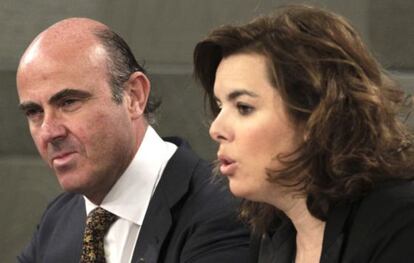Cabinet approves drastic plan to clean up the banking sector
Lenders will need coverage of up to 52 percent of value of loans to real estate developers Toxic assets to be removed from balance sheets and folded into separate companies Public funds will be available for institutions unable to meet new requirements


The Spanish government on Friday approved its second overhaul of the financial sector in little more than three months. While February’s decree attacked the issue of problematic real estate assets, this time around it focused on assets that are currently, in theory, healthy.
The new rules increase provisions for sound real estate loans by up to as much as 52 percent of their value, and oblige banks to remove toxic assets from their balance sheets and transfer them to real estate companies that will be set up before the end of the year. These companies will be obliged to sell at least 5 percent of their assets annually.
Provisions for loans currently considered to be healthy have been raised from 7 percent of their value to 30 percent, a development that De Guindos estimated would cost the banks between 28 and 30 billion euros. The reform also requires a coverage rate for loans to real estate developers without guarantees of 45 percent, and 7 percent in the case of developments that have been completed.
The latest provisions come on top of those ordered in the February decree, which cost the banks some 54 billion euros.
Share prices fell sharply in response to the reform, led by the banks, but subsequently recovered some ground. Spain’s risk premium also increased.
Lenders have a month to present their plans for cleaning up their balance sheets and up to the end of June in the case of banks that decide to merge as a solution to their problems. Banks unable to raise the funds to meet the new requirements will be entitled to loans from the state’s Orderly Banking Restructuring Fund (FROB).
The loans will take the form of contingent convertible bonds with a maturity of up to five years, and will carry an interest rate of 10 percent, twice the amount the Treasury currently pays on sovereign debt with a similar maturity. The government calculates that the amount the FROB will have to lend will not exceed 15 billion euros.
In response to demands from the Eurogroup, the government has also decided to hire two independent appraisers to determine the value of the property assets on the banks’ books. The assets will be transferred as book value minus the amount of provisions made for potential losses.
“Without certainty about the solvency of the banking system, the economy recovery will be much more difficult,” Economy Minister Luis de Guindos told a news conference after the regular Friday Cabinet meeting.
Spain’s banks are sitting on 184 billion euros of problematic assets related to the property sector. Total exposure to the sector including performing loans amounts to some 308 billion euros.







































